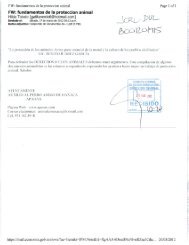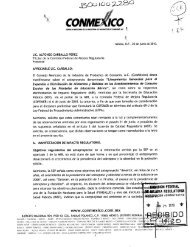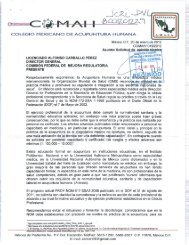Untitled
Untitled
Untitled
Create successful ePaper yourself
Turn your PDF publications into a flip-book with our unique Google optimized e-Paper software.
S98<br />
Carbohydrate intake and obesity<br />
RM van Dam and JC Seidell<br />
Popkin BM, Gordon-Larsen P (2004). The nutrition transition:<br />
worldwide obesity dynamics and their determinants. Int J Obes<br />
Relat Metab Disord 28 (Suppl 3), S2–S9.<br />
Poppitt SD, Prentice AM (1996). Energy density and its role in the<br />
control of food intake: evidence from metabolic and community<br />
studies. Appetite 26, 153–174.<br />
Poppitt SD, Keogh GF, Prentice AM, Williams DE, Sonnemans HM,<br />
Valk EE et al. (2002). Long-term effects of ad libitum low-fat, highcarbohydrate<br />
diets on body weight and serum lipids in overweight<br />
subjects with metabolic syndrome. Am J Clin Nutr 75, 11–20.<br />
Prentice AM, Jebb SA (2003). Fast foods, energy density and obesity: a<br />
possible mechanistic link. Obes Rev 4, 187–194.<br />
Raatz SK, Torkelson CJ, Redmon JB, Reck KP, Kwong CA, Swanson JE<br />
et al. (2005). Reduced glycemic index and glycemic load diets<br />
do not increase the effects of energy restriction on weight loss<br />
and insulin sensitivity in obese men and women. J Nutr 135,<br />
2387–2391.<br />
Raben A (2002). Should obese patients be counselled to follow a lowglycaemic<br />
index diet? No. Obes Rev 3, 245–256.<br />
Raben A, Macdonald I, Astrup A (1997). Replacement of dietary fat by<br />
sucrose or starch: effects on 14 d ad libitum energy intake, energy<br />
expenditure and body weight in formerly obese and never-obese<br />
subjects. Int J Obes Relat Metab Disord 21, 846–859.<br />
Raben A, Vasilaras TH, Moller AC, Astrup A (2002). Sucrose compared<br />
with artificial sweeteners: different effects on ad libitum food<br />
intake and body weight after 10 wk of supplementation in<br />
overweight subjects. Am J Clin Nutr 76, 721–729.<br />
Rigaud D, Ryttig KR, Angel LA, Apfelbaum M (1990). Overweight<br />
treated with energy restriction and a dietary fibre supplement: a<br />
6-month randomized, double-blind, placebo-controlled trial. Int J<br />
Obes 14, 763–769.<br />
Rolls BJ, Bell EA, Thorwart ML (1999). Water incorporated into a food<br />
but not served with a food decreases energy intake in lean women.<br />
Am J Clin Nutr 70, 448–455.<br />
Rolls BJ, Ello-Martin JA, Tohill BC (2004). What can intervention<br />
studies tell us about the relationship between fruit and vegetable<br />
consumption and weight management? Nutr Rev 62, 1–17.<br />
Rolls BJ, Roe LS, Beach AM, Kris-Etherton PM (2005). Provision of<br />
foods differing in energy density affects long-term weight loss.<br />
Obes Res 13, 1052–1060.<br />
Rossner S, von Zweigbergk D, Ohlin A, Ryttig K (1987). Weight<br />
reduction with dietary fibre supplements. Results of two doubleblind<br />
randomized studies.. Acta Med Scand 222, 83–88.<br />
Ruxton CH (2003). Dietary guidelines for sugar: the need for<br />
evidence. Br J Nutr 90, 245–247.<br />
Ryttig KR, Tellnes G, Haegh L, Boe E, Fagerthun H (1989). A dietary<br />
fibre supplement and weight maintenance after weight reduction:<br />
a randomized, double-blind, placebo-controlled long-term trial.<br />
Int J Obes 13, 165–171.<br />
Samaha FF, Iqbal N, Seshadri P, Chicano KL, Daily DA, McGrory J<br />
et al. (2003). A low-carbohydrate as compared with a low-fat diet<br />
in severe obesity. N Engl J Med 348, 2074–2081.<br />
Saris WH, Astrup A, Prentice AM, Zunft HJ, Formiguera X, Verboeketvan<br />
de Venne WP et al. (2000). Randomized controlled trial of<br />
changes in dietary carbohydrate/fat ratio and simple vs complex<br />
carbohydrates on body weight and blood lipids: the CARMEN<br />
study. The Carbohydrate Ratio Management in European National<br />
diets. Int J Obes Relat Metab Disord 24, 1310–1318.<br />
Schulze MB, Manson JE, Ludwig DS, Colditz GA, Stampfer MJ, Willett<br />
WC et al. (2004). Sugar-sweetened beverages, weight gain, and<br />
incidence of type 2 diabetes in young and middle-aged women.<br />
JAMA 292, 927–934.<br />
Schwartz MW, Porte Jr D (2005). Diabetes, obesity, and the brain.<br />
Science 307, 375–379.<br />
Schwartz MW, Boyko EJ, Kahn SE, Ravussin E, Bogardus C (1995).<br />
Reduced insulin secretion: an independent predictor of body<br />
weight gain. J Clin Endocrinol Metab 80, 1571–1576.<br />
Seidell JC (1998). Dietary fat and obesity: an epidemiologic<br />
perspective. Am J Clin Nutr 67, 546S–550S.<br />
European Journal of Clinical Nutrition<br />
Skov AR, Toubro S, Ronn B, Holm L, Astrup A (1999). Randomized<br />
trial on protein vs carbohydrate in ad libitum fat reduced diet for<br />
the treatment of obesity. Int J Obes Relat Metab Disord 23, 528–536.<br />
Slabber M, Barnard HC, Kuyl JM, Dannhauser A, Schall R (1994).<br />
Effects of a low-insulin-response, energy-restricted diet on weight<br />
loss and plasma insulin concentrations in hyperinsulinemic obese<br />
females. Am J Clin Nutr 60, 48–53.<br />
Slavin JL (2005). Dietary fiber and body weight. Nutrition 21,<br />
411–418.<br />
Sloth B, Krog-Mikkelsen I, Flint A, Tetens I, Bjorck I, Vinoy S et al.<br />
(2004). No difference in body weight decrease between a lowglycemic-index<br />
and a high-glycemic-index diet but reduced LDL<br />
cholesterol after 10-wk ad libitum intake of the low-glycemic-index<br />
diet. Am J Clin Nutr 80, 337–347.<br />
Smith JB, Niven BE, Mann JI (1996). The effect of reduced extrinsic<br />
sucrose intake on plasma triglyceride levels. Eur J Clin Nutr 50,<br />
498–504.<br />
Smith-Warner SA, Elmer PJ, Tharp TM, Fosdick L, Randall B, Gross M<br />
et al. (2000). Increasing vegetable and fruit intake: randomized<br />
intervention and monitoring in an at-risk population. Cancer<br />
Epidemiol Biomarkers Prev 9, 307–317.<br />
Sorensen TI, Boutin P, Taylor MA, Larsen LH, Verdich C, Petersen L<br />
et al. (2006). Genetic polymorphisms and weight loss in obesity: a<br />
randomised trial of hypo-energetic high- versus low-fat diets. PLoS<br />
Clin Trials 1, e12.<br />
Spieth LE, Harnish JD, Lenders CM, Raezer LB, Pereira MA, Hangen SJ<br />
et al. (2000). A low-glycemic index diet in the treatment of<br />
pediatric obesity. Arch Pediatr Adolesc Med 154, 947–951.<br />
Stern L, Iqbal N, Seshadri P, Chicano KL, Daily DA, McGrory J et al.<br />
(2004). The effects of low-carbohydrate versus conventional<br />
weight loss diets in severely obese adults: one-year follow-up of<br />
a randomized trial. Ann Intern Med 140, 778–785.<br />
Stookey JD (2001). Energy density, energy intake and weight status in<br />
a large free-living sample of Chinese adults: exploring the<br />
underlying roles of fat, protein, carbohydrate, fiber and water<br />
intakes. Eur J Clin Nutr 55, 349–359.<br />
Stubbs RJ, Whybrow S (2004). Energy density, diet composition and<br />
palatability: influences on overall food energy intake in humans.<br />
Physiol Behav 81, 755–764.<br />
Stubbs RJ, Johnstone AM, O’Reilly LM, Barton K, Reid C (1998). The<br />
effect of covertly manipulating the energy density of mixed diets<br />
on ad libitum food intake in ‘pseudo free-living’ humans. Int J Obes<br />
Relat Metab Disord 22, 980–987.<br />
Teff KL, Elliott SS, Tschop M, Kieffer TJ, Rader D, Heiman M et al.<br />
(2004). Dietary fructose reduces circulating insulin and leptin,<br />
attenuates postprandial suppression of ghrelin, and increases<br />
triglycerides in women. J Clin Endocrinol Metab 89, 2963–2972.<br />
Thompson WG, Rostad Holdman N, Janzow DJ, Slezak JM, Morris<br />
KL, Zemel MB (2005). Effect of energy-reduced diets high in dairy<br />
products and fiber on weight loss in obese adults. Obes Res 13,<br />
1344–1353.<br />
Tordoff MG, Alleva AM (1990). Effect of drinking soda sweetened<br />
with aspartame or high-fructose corn syrup on food intake and<br />
body weight. Am J Clin Nutr 51, 963–969.<br />
Toubro S, Astrup A (1997). Randomised comparison of diets for<br />
maintaining obese subjects’ weight after major weight loss: ad lib,<br />
low fat, high carbohydrate diet v fixed energy intake. BMJ 314, 29–34.<br />
Tsihlias EB, Gibbs AL, McBurney MI, Wolever TM (2000). Comparison<br />
of high- and low-glycemic-index breakfast cereals with<br />
monounsaturated fat in the long-term dietary management of<br />
type 2 diabetes. Am J Clin Nutr 72, 439–449.<br />
Tuomilehto J, Lindstrom J, Eriksson JG, Valle TT, Hamalainen H,<br />
Ilanne-Parikka P et al. (2001). Prevention of type 2 diabetes<br />
mellitus by changes in lifestyle among subjects with impaired<br />
glucose tolerance. N Engl J Med 344, 1343–1350.<br />
Valdez R, Mitchell BD, Haffner SM, Hazuda HP, Morales PA,<br />
Monterrosa A et al. (1994). Predictors of weight change in a biethnic<br />
population. The San Antonio Heart Study. Int J Obes Relat<br />
Metab Disord 18, 85–91.
















